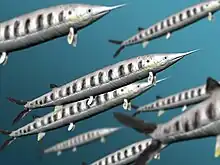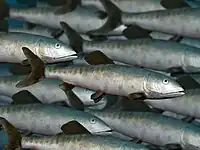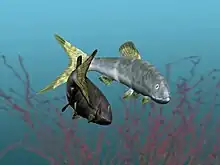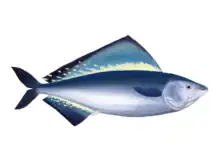| Cooyoo Temporal range: | |
|---|---|
 | |
| Reconstruction according to specimen "Wandah" | |
| Scientific classification | |
| Kingdom: | |
| Phylum: | |
| Class: | |
| Superorder: | |
| Order: | |
| Family: | |
| Genus: | †Cooyoo Bartholomai & Less,[1] 1987 |
| Binomial name | |
| †Cooyoo australis Bartholomai & Less, 1987 (Woodward, 1894) | |
| Synonyms | |
| |
Cooyoo is a primitive ichthyodectid found in Lower Cretaceous strata of Queensland, Australia.[1] As with all other ichthyodectids, it was a predator of smaller fish. It is known from complete specimen with length about 1.1 metres (3.6 ft). The type species, named in 1987, is C. australis,[1] although Arthur Smith Woodward originally named it as a species of Portheus (now a probable synonym of Xiphactinus) in 1894, which was later amended to Xiphactinus.
In 2011,[2] 2.5 metres (8.2 ft) long intact fossil of Cooyoo in north-west Queensland is discovered, nicknamed "Wandah". According to Rob Levers, Kronosaurus Korner museum founder and chairman, it was possible to detect the fish in the stomach of that specimen.[3]
References
- 1 2 3 Bartholomai; Less (1987). "Cretaceous actinopterygian (Class Pisces) Cooyoo australis from Queensland". Memoirs of the Queensland Museum.
- ↑ "Kronosaurus Korner - Fish". www.kronosauruskorner.com.au. Retrieved 2023-07-06.
- ↑ "Tourists unearth 100 million-year-old marine predator in western Queensland". ABC News. 2023-02-28. Retrieved 2023-03-03.
This article is issued from Wikipedia. The text is licensed under Creative Commons - Attribution - Sharealike. Additional terms may apply for the media files.






